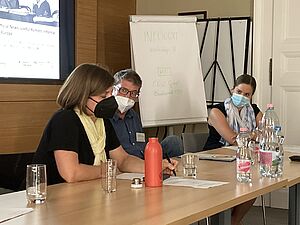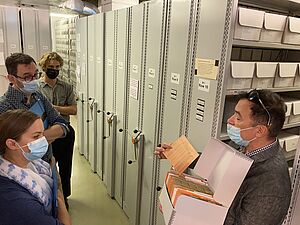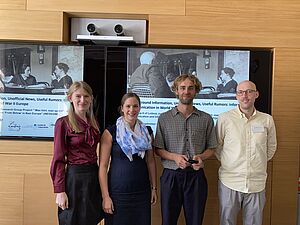- The Institute
- Research
- Dictatorships in the 20th Century
- Democracies and their Historical Self-Perceptions
- Transformations in Most Recent History
- International and Transnational Relations
- Edited Source Collections
- Dissertation Projects
- Completed Projects
- Dokumentation Obersalzberg
- Center for Holocaust Studies
- Berlin Center for Cold War Studies
- Publications
- Vierteljahrshefte
- The Archives
- Library
- Center for Holocaust Studies
- News
- Dates
- Press
- Recent Publications
- News from the Institute
- Topics
- Munich 1972
- Confronting Decline
- Feminist, Pacifist, Provocateur
- Der Mauerbau als Audiowalk
- Digital Contemporary History
- Transportation in Germany
- Envisaged Futures at the End of the Cold War
- From the Reichsbank to the Bundesbank
- German Federal Chancellery
- History of Sustainabilities: Discourses and Practices since the 1970s
- Changing Work
- Democratic Culture and the Nazi Past
- The History of the Treuhandanstalt
- Foreign Policy Documentation (AAPD)
- Dokumentation Obersalzberg
- Hitler, Mein Kampf. A Critical Edition
- "Man hört, man spricht"
- Dates
- Press
- Recent Publications
- News from the Institute
- Topics
- Munich 1972
- Confronting Decline
- Feminist, Pacifist, Provocateur
- Der Mauerbau als Audiowalk
- Digital Contemporary History
- Transportation in Germany
- Envisaged Futures at the End of the Cold War
- From the Reichsbank to the Bundesbank
- German Federal Chancellery
- History of Sustainabilities: Discourses and Practices since the 1970s
- Changing Work
- Democratic Culture and the Nazi Past
- The History of the Treuhandanstalt
- Foreign Policy Documentation (AAPD)
- Dokumentation Obersalzberg
- Hitler, Mein Kampf. A Critical Edition
- "Man hört, man spricht"
INFOCOM Workshop II at Central European University, 8th-10th September 2021
8th-10th September 2021

The second workshop of the Leibniz Junior Research Group “‘Man hört, man spricht’: Informal Communication and Information ‘From Below’ in Nazi Europe” (INFOCOM), entitled “Underground Information, Unofficial News, Useful Rumors: Informal Communication in World War II Europe,” explored unofficial communication in wartime Europe and beyond. This three-day event was organized by the Leibniz Institute for Contemporary History (IfZ) – Munich (Caroline Mezger and Izabela Paszko), in cooperation with the Central European University (CEU) Department of History and Pasts, Inc. Center for Historical Studies (Marsha Siefert, Monika Nagy, and Ágoston Berecz). It was hosted by CEU in Budapest (Hungary) between the 8th and 10th September 2021 and streamed via Zoom to invited participants who could not attend the workshop in person.
With its focus on communication practices during the wartime and postwar periods, this workshop explored the role of informal communication in different transnational contexts, highlighting its relationship to official state mass media and its embeddedness in particular social realities. The case studies discussed during the event highlighted the similarities of the entanglement of informal communication practices “from below” with state-maintained media channels “from above” in different historical contexts.
Overall, the workshop was an occasion for the INFOCOM team and various CEU-affiliated researchers to present their findings and ongoing investigations and to discuss the Project’s theoretical underpinnings. More broadly, this event enabled discussions on informality, the public sphere, the public-private distinction, and various forms of communication from a range of historical and disciplinary contexts.
In her opening remarks, MARSHA SIEFERT talked about broadening our historical research to include the study of everyday life and bottom-up perspectives on major events. She highlighted the importance of including the countries of eastern and southeastern Europe to understand the role of informal communication, from the operation and maintenance of oppositional groups like partisans to the ways in which ordinary citizens tried to find sustenance - both physical and emotional - in war zones and in areas devastated by the conflict. Siefert introduced the new CEU Erasmus Master’s program, History in the Public Sphere, as contributing to debates on the role of communication in studying modern history.
Following this welcome, CAROLINE MEZGER thanked the workshop co-organizers and introduced the workshop’s main aims and themes. She provided an overview of the INFOCOM Project and its motivations as a response to brewing epistemic crises surrounding proclamations of a “postfactual era.” Offering a brief historiographical overview of informal communication and “fake news,” she emphasized the need to address questions of communication to gain insight into sense-making, social relations, and agency under conditions of war and dictatorship. She then opened a discussion on a draft article by the INFOCOM team, entitled “What was the Public Sphere under National Socialism?: A Multidisciplinary View on Communication, the Public/Private Distinction, Language, and Sense-Making under Conditions of Dictatorship.” MANUEL MORK, IZABELA PASZKO, FELIX BERGE and Caroline Mezger briefly described their contributions to the article. This theoretical overview stimulated a lively discussion on (informal) communication and its relation to “public spheres” in various European dictatorships of the twentieth century.
These theoretical discussions were followed by a first panel on “Informal Communication in Nazi Europe: Case Studies” with papers by Felix Berge, Izabela Paszko, Manuel Mork, and Caroline Mezger. Each of the panelists introduced their own projects, which they illustrated using original case studies. In his presentation on informal communication on the German home front during World War II, Felix Berge emphasized the role of informal communication in structuring Nazi Germany’s fragmented society. Manuel Mork analyzed informal communication practices in the context of the Nazi authorities’ manipulation of the mass media in occupied France. Izabela Paszko discussed informal communication practices as coping mechanisms and survival strategies in relation to German-occupied Poland. Caroline Mezger introduced her theoretical approach in using the history of informal communication to entangle diverse cases of forced migration under and immediately following the Third Reich.
A panel on “Violence, Ideological Rivalry, and Political Communication in the Wartime Balkans,” opened the workshop’s second day. Papers by LOVRO KRALJ, NICK WARMUTH and IVA JELUŠIĆ explored informal information practices in wartime Yugoslavia and in Nazi concentration camps. Lovro Kralj presented the multiethnic borderland town of Osijek to explore competing fascisms in the context of the Holocaust, while Nick Warmuth examined the repercussions of language, national ascriptions, and “Lagersprache” in affecting prisoners’ experiences at the KL Flossenbürg. Iva Jelušić provided insights into her research on women’s roles and agency in maintaining subversive information channels in wartime Yugoslavia.

The next panel, “Archival Traces and Informal Communication in Postwar Eastern Europe,” reflected on the challenges and difficulties in conducting archival research on the ephemeral and often unwritten evidence of informal communication. IOANA MACREA-TOMA offered a theoretical engagement with the Open Society Archive’s collection of Radio Free Europe observation reports, while ANDRAS MINK presented a case study of postwar rumors surrounding the 1956 revolution in Hungary based on his own family history. OKSANA SARKISOVA reflected on personal photograph collections in postwar Russia to highlight the importance of visual materials in negotiating interpersonal communication, family remembrance, and the public/private divide in relation to the “Great Patriotic War.” After the discussion, chaired by Caroline Mezger, the workshop participants had an opportunity to attend a thematic tour at the Vera and Donald Blinken Open Society Archives (OSA) at Central European University (CEU), delivered by ROBERT PARNICA and Andras Mink. The visit at the OSA and ensuing discussions concluded the workshop’s second day.
The final panel of the conference, under the title “On the Soviet Front: Information Deficits, Unpublished Novels, and Popular Song during and after the Great Patriotic War,” presented novel perspectives on informal communication practices and their relation to different media. Papers presented by CHARLES SHAW, FARUH KUZIEV and MARSHA SIEFERT introduced original case studies from the wartime and postwar USSR. Charles Shaw employed a postcolonial approach to investigate the role of rumors on the Soviet Central Asian home front, reflecting on questions of tone, mood, and medium in designating different forms of communication. Faruh Kuziev elaborated on a collection of private correspondence from Tajikistan, introducing the medium of “novel-letters” as a means for negotiating feelings of deprivation and remoteness. Marsha Siefert completed the workshop with a discussion of diverse musical forms as a type of emotional and lyrical communication, which emerged either in opposition to or in harmony with the Soviet regime.

As a whole, the workshop illustrated the importance of informal communication as a vehicle for expression and opposition, as a vital factor for survival and maintaining social bonds, and as a window into wartime social dynamics and mentalities “from below.” With the help of diverse media, such as visual forms of communication or narratives derived from different genres, the workshop extended the Project’s themes into the postwar period, giving the attendees opportunities to reflect on the role of informal communication as an instrument of commemoration and civil initiatives. The various papers highlighted the complex entanglement of state-driven communication and individual responses to these in different twentieth-century dictatorships, underscoring the importance of informal communication in moments of crisis.
Conference Overview:
Welcome by Marsha Siefert, Caroline Mezger
Introduction to INFOCOM Project, Discussion of Theoretical Framework/INFOCOM Paper (INFOCOM Team – Caroline Mezger, Felix Berge, Manuel Mork, Izabela Paszko)
Panel I – Informal Communication in Nazi Europe: Case Studies
Chair: Marsha Siefert
Felix Berge: “Hearing and Speaking in War: Practices of Informal Communication in the National Socialist Majority Society, 1939–1945”
Manuel Mork: “An Occupied Public: German Informational Politics, Popular Narratives, and the Public Perception of the Occupier in French Wartime Society (1940–44)”
Izabela Paszko: “Information more valuable than bread? Informal Communication as a Coping Strategy — The Example of Occupied Poland (1939–1945)”
Caroline Mezger: “Rumor and Displacement: Towards an Entangled History of Forced Migration under the Third Reich”
Panel II – Violence, Ideological Rivalry, and Political Communication in the Wartime Balkans
Chair: Constantin Iordachi
Lovro Kralj: “Negotiating Genocide in a Microcosmos of Fascism: Nazis, Ustashe and the Arrow Cross in the City of Osijek, 1941–42”
Nick Warmuth: “Languages of the Concentration Camp – Communication and Resistance in KL Flossenbürg”
Iva Jelušić: “The Role of Women in Maintaining the Partisan Information Network in Wartime Yugoslavia”
Panel III – Archival Traces and Informal Communication in Postwar Eastern Europe
Chair: Caroline Mezger
Ioana Macrea-Toma: “Relic Data or Knowledge? The Art and Science of Information Processing at Radio Free Europe during the Cold War”
Andras Mink: “Hopes of Misunderstanding. Gossips of the 1956 Hungarian Revolution”
Oksana Sarkisova: “Traces of War: Private Photographic Collections and Memories of WWII in Russia”
Session at Open Society Archives (OSA)
Panel IV: On the Soviet Front: Information Deficits, Unpublished Novels, and Popular Song during and after the Great Patriotic War
Chair: Alfred Rieber
Charles Shaw: “Timur’s Ghost, Basmachi Revolts, and other Tall Tales: The Convergence of Information Deficits on the Soviet Central Asian Homefront”
Faruh Kuziev: “The Sharora Republic of Letters: Two Women’s Correspondence and ‘Letter-Novels’ in the USSR”
Marsha Siefert: “Three Tenors in Stalin’s War: Popular Song, Politics, and Affective Communication”
Final Discussion / Roundtable
Chair: Marsha Siefert, Caroline Mezger


